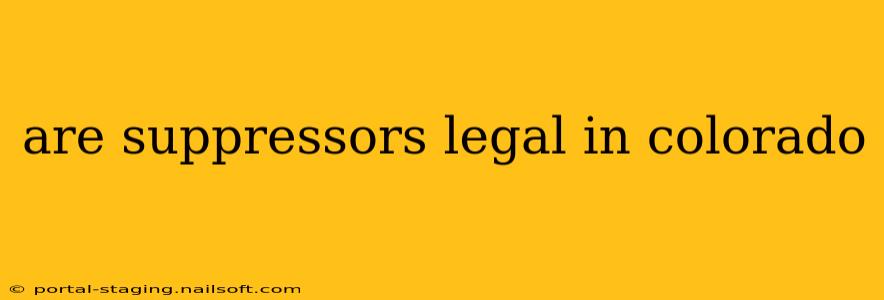The legality of firearm suppressors, often called silencers, can be confusing. This guide clarifies the regulations surrounding suppressor ownership and use in Colorado. Understanding these laws is crucial for responsible gun ownership.
Colorado Suppressor Laws: The Basics
Colorado allows the possession and use of firearm suppressors, but with important stipulations. It's not a "suppressor-free" state like some others. However, the process of legally acquiring a suppressor involves navigating federal and state regulations. The key takeaway is that while legal, it's not a simple process.
Federal Regulations: The National Firearms Act (NFA)
Before diving into Colorado-specific laws, it's vital to understand the federal requirements governed by the National Firearms Act (NFA). The NFA classifies suppressors as National Firearms Act (NFA) items, meaning their ownership and transfer are subject to strict federal regulations. This involves:
- Bureau of Alcohol, Tobacco, Firearms and Explosives (ATF) Registration: You must register your suppressor with the ATF. This involves a rigorous background check and a significant waiting period.
- Tax Stamp: A substantial tax is levied on the suppressor purchase.
- Serial Numbering: All legal suppressors have a serial number for tracking purposes.
Ignoring these federal requirements can lead to serious legal consequences, including hefty fines and imprisonment.
Colorado-Specific Regulations
While Colorado doesn't prohibit suppressor ownership, it aligns with federal regulations. Therefore, complying with the NFA is paramount. Colorado's laws don't add significant extra burdens beyond the federal requirements. This means you'll need to:
- Obtain a Federal Tax Stamp: This is the cornerstone of legal suppressor ownership.
- Complete the ATF Application: This application requires detailed information and undergoes a thorough background check.
- Understand Transportation Laws: Transporting a suppressor across state lines requires adhering to both federal and state regulations. Be sure to transport it in compliance with all relevant laws.
Common Misconceptions about Suppressors
Let's address some common misunderstandings:
Myth: Suppressors Make Guns Silent
Reality: Suppressors significantly reduce the sound of a firearm, but they don't eliminate it entirely. Think of it as a significant reduction in noise, not complete silence. The level of sound reduction varies depending on the suppressor's design and the firearm it's used with.
Myth: Suppressors are Only for Hunters
Reality: Suppressors have various applications, including hunting, law enforcement, target shooting, and personal defense. Their use in these contexts depends on the specific regulations and individual needs.
Myth: Obtaining a Suppressor is Easy
Reality: The process is lengthy and requires meticulous adherence to federal regulations. Be prepared for paperwork, background checks, and waiting periods.
Conclusion: Responsible Suppressor Ownership in Colorado
Owning a suppressor in Colorado is legal but demands careful attention to both federal (NFA) and state laws. The process is not simple and requires patience and thorough understanding of the regulations. Before purchasing a suppressor, consult with legal professionals and the ATF to ensure compliance with all applicable laws. Responsible gun ownership includes knowing and respecting the laws surrounding firearm accessories like suppressors. Remember, ignorance of the law is no excuse.
